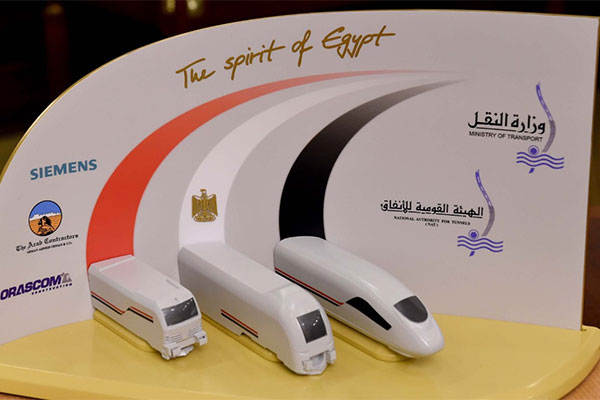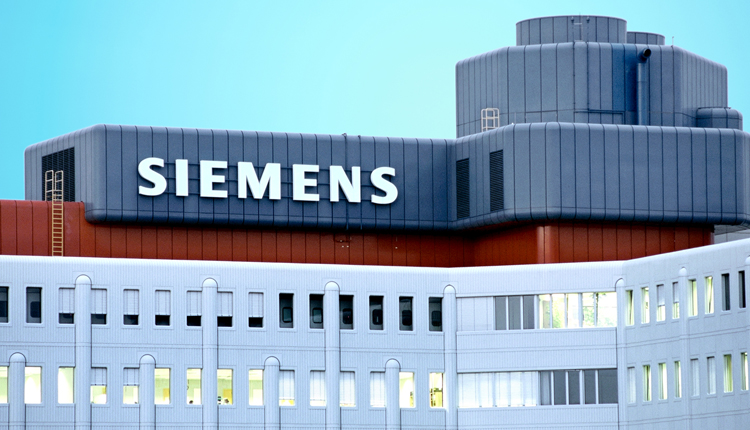Siemens Mobility is expecting to finalise contracts for the second and third lines of Egypt’s $4.45 billion high-speed electric rail system by the end of the year after financial closing.
The project is already generating a “high level of interest” from other countries in the region, Leon Soulier, Siemens Mobility’s chief executive for the Middle East and Africa, told The National on the sidelines of the Middle East Rail exhibition in Dubai.
Siemens is in ongoing discussions with Egypt’s Ministry of Transport and the National Authority for Tunnels (NAT) on the two lines, Soulier said.

The German company is awaiting the go-ahead from the Egyptian Cabinet.
“The idea is that we would still close both contracts within this calendar year, subject to financial close, because not only are we doing the construction, supply and maintenance, we are also providing a financing package,” Soulier further said.
“What we need is the Egyptian Cabinet’s approval for the Ministry of Transport to be mandated to sign the further lines and this is the important step that remains to be done. We’re bringing the financing, but in the end the financing has to be repaid, just subject to Cabinet approval.” he noted.
In September, a consortium comprising Orascom Construction, Siemens Mobility, and Arab Contractors won the multibillion-dollar contract for Egypt’s first high-speed railway line that will connect the country’s Red Sea and Mediterranean coasts. It is a deal that covers the initial 660-kilometre line out of the total 1,800 kilometres of rail network planned.
Siemens has dubbed the project a “Suez Canal on rails”. It will receive a share of $3 billion out of the total $4.45 billion contract value.
The company aims to deliver the first of its high-speed trains, which will be adapted for Egypt’s climate, within two years, Soulier said.
The 660-kilometre line is designed to carry up to 30 million people per year, set to save up to 50 percent travel time and cut carbon emissions by 70 percent, compared to the current use of cars and buses.
This project is part of Egypt’s wider plans to upgrade its overcrowded transport network, protect the environment, create jobs, and develop its economy.

The financing of the project will be based on engineering, procurement and construction (EPC), plus financing basis. The consortium will help structure and arrange the financing.
Siemens “have engaged with banks and financial institutions to see if they can provide loans for this project, but this is from the banks directly to the Egyptian government, the Ministry of Finance and the central bank”, Soulier added.
“We have facilitated those discussions and this is still ongoing, the financial close is still pending.”
Normally, the financial close occurs within 12 months of the EPC contract being signed, but in this case, it may be sooner than September 2022, Soulier said.
“We as a company are not waiting for that, we have started already preparing the production lines for the trains, making a lot of design decisions which resonated with the client during the negotiations,” he stated.
“We pre-started it because the Egyptian government asked us to do this on the fast track, so we took this quite seriously.”
Siemens’ project in Egypt has garnered interest from other markets in the Middle East and Africa in high-speed electric rail systems, he noted.
“We have seen an interest because this project was not on the radar, it was not planned for 10 years and now it finally came to fruition. It was a direct negotiation and a direct partnership with the client,” Soulier said.
“Walking around the exhibition, we got a lot of questions.”
The executive said there are many countries in the region planning their own main railway lines and there are opportunities to engage with customers on taking a similar approach to Egypt. Among those is the planned GCC railway network, which would be “a perfect fit” for this type of high-speed rail connection, he added.
The Siemens executive confirmed ongoing discussions with some countries in the region but it is “too early” to reveal customers and the main focus is on finalising the remaining agreements with Egypt.
“Our biggest priority now is to ensure and secure the second and the third line because that’s obviously on the table and this would bring the scale that we would need to do a project like this, it’s really a seismic shift,” Soulier said.


